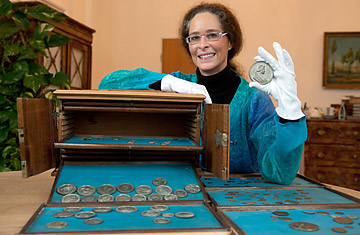
Caretaker Tanja Hoels sits in the State Library next to a case with coins and medals in Passau, Germany, December 7, 2011.

This post is in partnership with Worldcrunch, a new global-news site that translates stories of note in foreign languages into English. The article below was originally published in Süddeutsche Zeitung.
PASSAU — It's not that it went unnoticed. After all, staff at the State Library in Passau had been giving the wooden box regular dustings for years. It's just that until recently, nobody ever thought to pop the lid and take a peek inside.
Recently, though, curiosity got the better of Tanja Höls, who had worked at the State Library for a year and a half. The 43-year-old janitor turned the key on the coffer, opened the box's top and, to her astonishment, discovered a veritable treasure trove of valuable old coins. In total, the box contained 172 coins with an estimated worth in the low six figures.
The coins and heavy medallions are made of silver, bronze and copper and are of Greek, Roman and Byzantine origin. Some date from the Baroque and the Napoleonic eras. Höls reports that they were organized inside the box in a very orderly manner.
The director of the State Library, Markus Wennerhold, still can't quite believe that the trove had just been sitting there, in a fourth floor stock room in the former Jesuit boarding school on Michaeligasse that now houses the library. The building dates back to the 17th century — it was constructed between 1630 and 1639 — and is stuffed with valuable old items. The librarian says that this, however, is a first.
"Sometimes we come across books that haven't been electronically catalogued yet, but never a trove like this," he says. The "absolutely beautiful pieces" are in very good condition, and vary in size and weight. So-called bracteates dating back to late classical antiquity and the Middle Ages are no larger than a finger nail. Made of rolled silver, stamped on one side, they were used for payment purposes. They weigh between one half and one gram. The showpiece of the collection, a silver commemorative medallion the size of a small plate, weighs 200 grams.
The stock room where the light wood coffer was stored contains all sorts of other antiques. "But our stock rooms are by no means a jumbled mess," library head Wennerhold stresses. Tanja Höls said she was curious about it because "ever since I was a kid I have collected little boxes and coffers, so this quite naturally interested me." When she saw what was inside, she brought it immediately to the astonished director.
A case of 17th century tax evasion?
Mr. Wennerhold believes the contents of the box are part of a valuable coin collection that belonged to Passau's Bishop-Princes. It had perhaps been hidden, as many Church treasures were, to avoid being carted off to Munich during the 1803 secularization — which in this case would have meant that the Elector of Bavaria's tax officers missed the most valuable pieces in the collection. The decorative medallions and a unique piece minted in honor of the founding of Passau's Jesuit church show virtually no signs of wear and tear.
Wennerhold contacted his predecessors and found out that the trove was literally forgotten. "Some of them who held the job in the last few decades knew about the coins, but didn't realize their significance." So the coins were left undisturbed in the little box. But that also means, says Wennerhold, that Höls's find is not a discovery but a re-discovery. The janitor is not, therefore, entitled to a reward. Wennerhold say she does, however, plan to ask her out to dinner one of these days.
For Tanja Höls, the incident is just further proof that hers is a "dream job." "I know every corner of this building, and in the future my eyes are going to be more peeled than ever for interesting finds."
The library in Passau — which is located in Lower Bavaria — is one of Germany's oldest public book collections and possesses major old works on theology and Jesuitism. Next year it celebrates its 400th anniversary — and the trove of coins will be on exhibit. By then, Wennerhold says, experts in numismatics will have had the time to value the collection at its exact worth.
Meanwhile, everyone at the library has been infected with treasure fever. In among old manuscripts and thousands of publications someone has located a stuffed crocodile. It was originally in the nature collection of the St. Nikola cloister. When church treasures were carted off in 1803 it turned out to be too large for the cart. But nobody knows anything more about the crocodile than that.
"We'll check out its stomach, maybe it swallowed a missionary or something," jokes Wennerhold.
Germany's First Lady Embroiled in Scandal
— Die Welt
Capitalism over Caste: The Success of India's 'Untouchable' CEOs
— Les Echos
Macedonia: Europe's New Hotspot for Illegal Immigrants
— Les Temps
